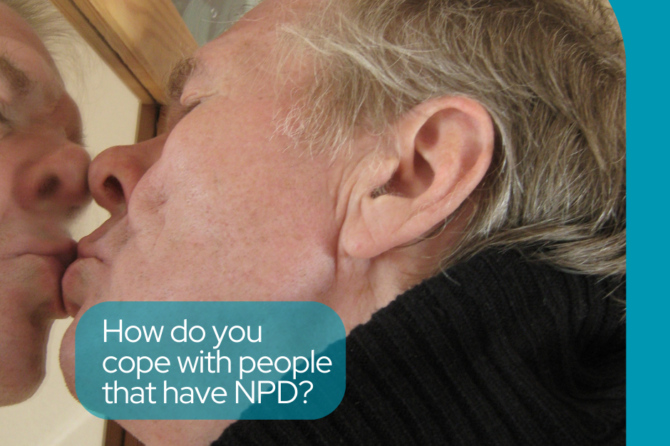Narcissistic Personality Disorder
Know someone who thinks they’re better than everyone else but flies off the handle at the slightest criticism? These tips from a narcissistic recovery therapist can help you spot narcissism traits and deal with a narcissist.
Signs and symptoms of narcissistic personality disorder

Grandiose sense of self-importance
Grandiosity is the defining characteristic of narcissism. More than just arrogance or vanity, grandiosity is an unrealistic sense of superiority. Narcissists believe they are unique or “special” and can only be understood by other special people. What’s more, they are too good for anything average or ordinary. They only want to associate and be associated with other high-status people, places, and things.
Narcissists also believe that they’re better than everyone else and expect recognition as such—even when they’ve done nothing to earn it. They will often exaggerate or outright lie about their achievements and talents. And when they talk about work or relationships, all you’ll hear is how much they contribute, how great they are, and how lucky the people in their lives are to have them. They are the undisputed star and everyone else is at best a bit player.
Lives in a fantasy world that supports their delusions of grandeur
Since reality doesn’t support their grandiose view of themselves, narcissists live in a fantasy world propped up by distortion, self-deception, and magical thinking. They spin self-glorifying fantasies of unlimited success, power, brilliance, attractiveness, and ideal love that make them feel special and in control. These fantasies protect them from feelings of inner emptiness and shame, so facts and opinions that contradict them are ignored or rationalized away. Anything that threatens to burst the fantasy bubble is met with extreme defensiveness and even rage, so those around the narcissist learn to tread carefully around their denial of reality and may seek help from a narcissistic recovery therapist.
Needs constant praise and admiration
A narcissist’s sense of superiority is like a balloon that gradually loses air without a steady stream of applause and recognition to keep it inflated. The occasional compliment is not enough. Narcissists need constant food for their ego, so they surround themselves with people who are willing to cater to their obsessive craving for affirmation. These relationships are very one-sided. It’s all about what the admirer can do for the narcissist, never the other way around. And if there is ever an interruption or diminishment in the admirer’s attention and praise, the narcissist treats it as a betrayal.
Sense of entitlement
Because they consider themselves special, narcissists expect favorable treatment as their due. They truly believe that whatever they want, they should get. They also expect the people around them to automatically comply with their every wish and whim. That is their only value. If you don’t anticipate and meet their every need, then you’re useless. And if you have the nerve to defy their will or “selfishly” ask for something in return, prepare yourself for aggression, outrage, or the cold shoulder.
Exploits others without guilt or shame
Narcissists never develop the ability to identify with the feelings of others—to put themselves in other people’s shoes. In other words, they lack empathy and could benefit from a narcissistic recovery therapist. In many ways, they view the people in their lives as objects—there to serve their needs. As a consequence, they don’t think twice about taking advantage of others to achieve their own ends. Sometimes this interpersonal exploitation is malicious, but often it is simply oblivious. Narcissists simply don’t think about how their behavior affects others. And if you point it out, they still won’t truly get it. The only thing they understand is their own needs.
Frequently demeans, intimidates, bullies, or belittles others
Narcissists feel threatened whenever they encounter someone who appears to have something they lack—especially those who are confident and popular. They’re also threatened by people who don’t kowtow to them or who challenge them in any way. Their defense mechanism is contempt. The only way to neutralize the threat and prop up their own sagging ego is to put those people down. They may do it in a patronizing or dismissive way as if to demonstrate how little the other person means to them. Or they may go on the attack with insults, name-calling, bullying, and threats to force the other person back into line.
Different types of narcissist
Narcissism comes in several forms. Adaptive narcissism is when a person with this disorder leans into positive traits—such as self-sufficiency and confidence—that can actually be healthy. They may help someone set high ambitions at work, for example, or enjoy satisfying relationships without being overdependent on a partner.
Maladaptive narcissism, on the other hand, is characterized by the toxic traits, such as a sense of entitlement and willingness to exploit others. The different forms of maladaptive narcissism include:
Overt or grandiose narcissism. Overt narcissists tend to be extroverted but also uncooperative, selfish, and overbearing. Their exaggerated self-image and high self-esteem allow them to be confident and assertive. However, they’re also likely to overestimate their own emotional intelligence and could see improvement if willing to work with a narcissistic recovery therapist.
Covert or vulnerable narcissism. It’s common to imagine all narcissists as dominant and overwhelming in social situations. However, covert narcissists are introverted. They tend to be extremely sensitive to criticism and suffer from low self-esteem. They can be defensive and passive-aggressive, but they are less likely to overestimate their emotional abilities than overt narcissists.
Communal narcissism. Communal narcissists tend to view themselves as altruistic and claim to care deeply about fairness. They present themselves to others as supportive and selfless. However, their behavior is motivated by a desire for social power and a sense of superiority or entitlement. Because of this, their actions don’t always match their beliefs.
Antagonistic narcissism. In contrast with communal narcissists, antagonistic narcissists take a highly competitive approach to social interactions. They often exhibit zero-sum thinking, believing that every situation has a “loser” and “winner.” This view of the world leads them to be aggressive and hostile. They may be quick to disparage others and slow or unwilling to forgive.
Malignant narcissism. Malignant narcissism can be a more destructive form of the personality disorder. In addition to the typical signs of narcissism, a malignant narcissist might be aggressive, paranoid, or sadistic—taking joy in other people’s pain. They tend to display antisocial behavior, disregarding the rights or safety of others.
Dealing with a narcissist: Don’t fall for the fantasy
Narcissists can be very magnetic and charming. They are very good at creating a fantastical, flattering self-image that draw us in. We’re attracted to their apparent confidence and lofty dreams—and the shakier our own self-esteem, the more seductive the allure. It’s easy to get caught up in their web, thinking that they will fulfill our longing to feel more important, more alive. But it’s just a fantasy, and a costly one at that.
Your needs won’t be fulfilled (or even recognized). It’s important to remember that narcissists aren’t looking for partners; they’re looking for obedient admirers. Your sole value to the narcissist is as someone who can tell them how great they are to prop up their insatiable ego. Your desires and feelings don’t count.
Look at the way the narcissist treats others. If the narcissist lies, manipulates, hurts, and disrespects others, he or she will eventually treat you the same way. Don’t fall for the fantasy that you’re different and will be spared. Find a narcissistic recovery therapist if you need support in looking at the ways you’ve been treated.
Take off the rose-colored glasses. It’s important to see the narcissist in your life for who they really are, not who you want them to be. Stop making excuses for bad behavior or minimizing the hurt it’s causing you. Denial will not make it go away. The reality is that narcissists are very resistant to change, so the true question you must ask yourself is whether you can live like this indefinitely.
Focus on your own dreams. Instead of losing yourself in the narcissist’s delusions, focus on the things you want for yourself. What do you want to change in your life? And what gifts would you like to develop? What fantasies do you need to give up in order to create a more fulfilling reality?
Set healthy boundaries for you!
Healthy relationships are based on mutual respect and caring. But narcissists aren’t capable of true reciprocity in their relationships. It isn’t just that they’re not willing; they truly aren’t able. They don’t see you. And they don’t hear you. They don’t recognize you as someone who exists outside of their own needs. Because of this, narcissists regularly violate the boundaries of others. What’s more, they do so with an absolute sense of entitlement.
Narcissists think nothing of going through or borrowing your possessions without asking, snooping through your mail and personal correspondence, eavesdropping on conversations, barging in without an invitation, stealing your ideas, and giving you unwanted opinions and advice. They may even tell you what to think and feel. It’s important to recognize these violations for what they are, so you can begin to create healthier boundaries where your needs are respected. Working with a narcissistic recovery therapist can help you.
Make a plan.
If you have a long-standing pattern of letting others violate your boundaries, it’s not easy to take back control. Set yourself up for success by carefully considering your goals and the potential obstacles. What are the most important changes you hope to achieve? Is there anything you’ve tried in the past with the narcissist that worked? Anything that hasn’t? What is the balance of power between you and how will that impact your plan? How will you enforce your new boundaries? Answering these questions will help you evaluate your options and develop a realistic plan.
Consider a gentle approach.
If preserving your relationship with the narcissist is important to you, you will have to tread softly. By pointing out their hurtful or dysfunctional behavior, you are damaging their self-image of perfection. Try to deliver your message calmly, respectfully, and as gently as possible. Focus on how their behavior makes you feel, rather than on their motivations and intentions. If they respond with anger and defensiveness, try to remain calm. Walk away if need be and revisit the conversation later.
Don’t set a boundary unless you’re willing to keep it.
You can count on the narcissist to rebel against new boundaries and test your limits, so be prepared. Follow up with any consequences specified. If you back down, you’re sending the message that you don’t need to be taken seriously.
Be prepared for other changes in the relationship.
The narcissist will feel threatened and upset by your attempts to take control of your life. They are used to calling the shots. To compensate, they may step up their demands in other aspects of the relationship, distance themselves to punish you, or attempt to manipulate or charm you into giving up the new boundaries. It’s up to you to stand firm.
Don’t take things personally
To protect themselves from feelings of inferiority and shame, narcissists must always deny their shortcomings, cruelties, and mistakes. Often, they will do so by projecting their own faults on to others. It’s very upsetting to get blamed for something that’s not your fault or be characterized with negative traits you don’t possess. But as difficult as it may be, try not to take it personally. It really isn’t about you.
Don’t buy into the narcissist’s version of who you are. Narcissists don’t live in reality, and that includes their views of other people. Don’t let their shame and blame game undermine your self-esteem. Refuse to accept undeserved responsibility, blame, or criticism. That negativity is the narcissist’s to keep.
Don’t argue with a narcissist. When attacked, the natural instinct is to defend yourself and prove the narcissist wrong. But no matter how rational you are or how sound your argument, they are unlikely to hear you. And arguing the point may escalate the situation in a very unpleasant way. Don’t waste your breath. Simply tell the narcissist you disagree with their assessment, then move on.
Know yourself. The best defense against the insults and projections of the narcissist is a strong sense of self. When you know your own strengths and weaknesses, it’s easier to reject any unfair criticisms leveled against you.
Let go of the need for approval. It’s important to detach from the narcissist’s opinion and any desire to please or appease them at the expense of yourself. You need to be okay with knowing the truth about yourself, even if the narcissist sees the situation differently.
Look for support and purpose elsewhere
If you’re going to stay in a relationship with a narcissist, be honest with yourself about what you can—and can’t—expect. A narcissist isn’t going to change into someone who truly values you, so you can look to a narcissistic recovery therapist for emotional support and personal fulfillment.


